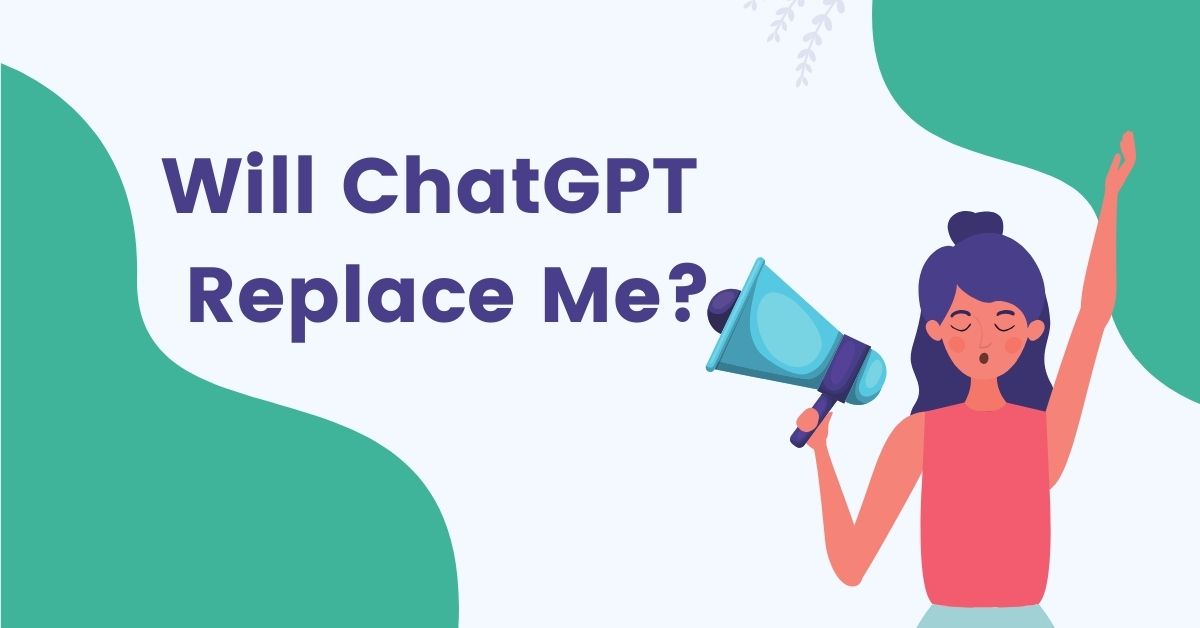
As a human being, it’s natural to have concerns about the impact of technology on your job prospects. With advancements like ChatGPT, it’s understandable to question whether or not these tools could eventually replace humans in certain roles.
But here’s the good news: ChatGPT is a tool designed to enhance and support human work, not replace it. In this blog, we’ll take a closer look at the role of ChatGPT in the workforce and explore how it can help humans perform their jobs more efficiently and effectively.
So, if you’re curious about the future of work and the impact of AI, keep reading.
Future of ChatGPT for Human Jobs
Will ChatGPT replace me in the near future? This is the silent question on the lips of many stunned by the ChatGPT’s impressive capabilities in tasks such as natural language processing, speech recognition, and text generation. Here’s how ChatGPT can affect human jobs.
Automation of Repetitive Tasks
One of the most significant impacts of ChatGPT on human jobs could be the automation of repetitive tasks. For example, ChatGPT can be used to automate customer support, answer frequently asked questions, and provide basic information to customers. This could free human customer service representatives to focus on more complex/nuanced issues.
ChatGPT could also be used to automate data entry and other administrative tasks, such as scheduling appointments and responding to emails. By automating these tasks, companies could reduce the need for human employees to perform them, leading to cost savings and increased efficiency.
However, it’s important to note that the automation of repetitive tasks is not a new phenomenon.
For decades, companies have been using automation technologies to reduce the need for human labor in various industries. ChatGPT is simply the latest and most advanced technology to be used for this purpose.
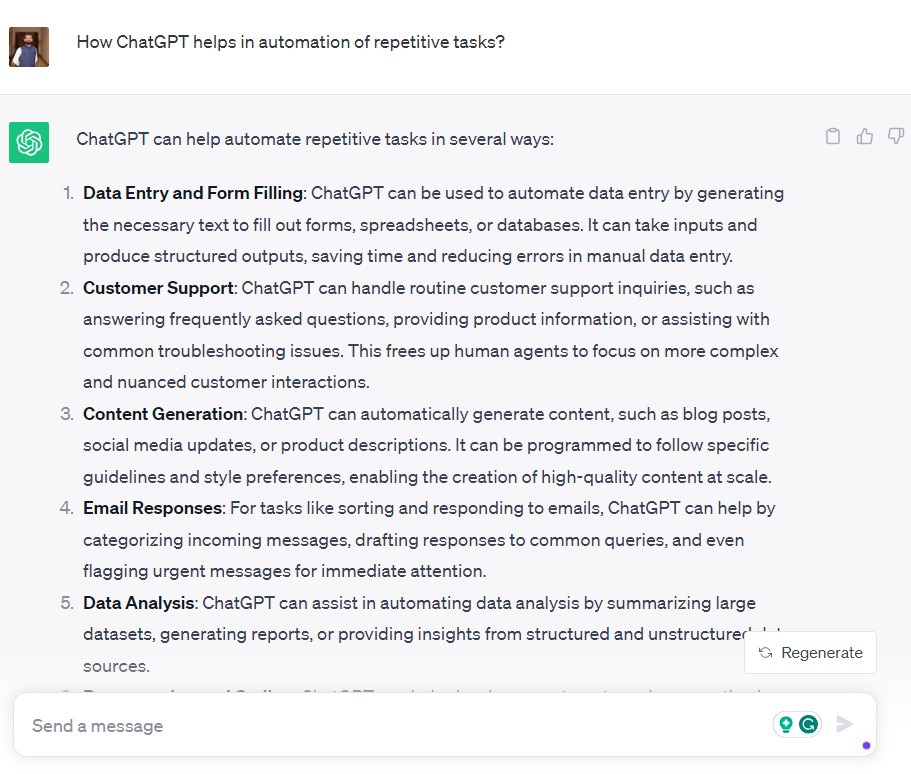
Augmentation of Human Capabilities
Another way in which ChatGPT could impact human jobs is by augmenting human capabilities.
For example, ChatGPT can be used to provide real-time language translation, which could be helpful for workers in multinational companies who need to communicate with colleagues and clients who speak different languages.
ChatGPT can assist human employees in tasks such as data analysis and decision-making. By analyzing large amounts of data and identifying patterns and trends, ChatGPT can provide valuable insights that humans may struggle to discern independently.
In these scenarios, ChatGPT is not replacing human workers but rather enhancing their abilities and making them more productive.
Creation of New Jobs
While ChatGPT may automate some jobs and augment others, it could also create new job opportunities. According to the World Economic Forum Future of Jobs Report, 97 million new jobs will be created by 2025 due to AI.
For example, as the use of ChatGPT becomes more widespread, there may be a growing demand for professionals who can develop and maintain these systems. This could include software developers, data scientists, and AI specialists.
ChatGPT could create new job opportunities in industries that are currently not using AI technology. For example, ChatGPT could be used in creative industries such as advertising and marketing to generate ad copy and product descriptions. One of the product descriptions written by ChatGPT is as follows:
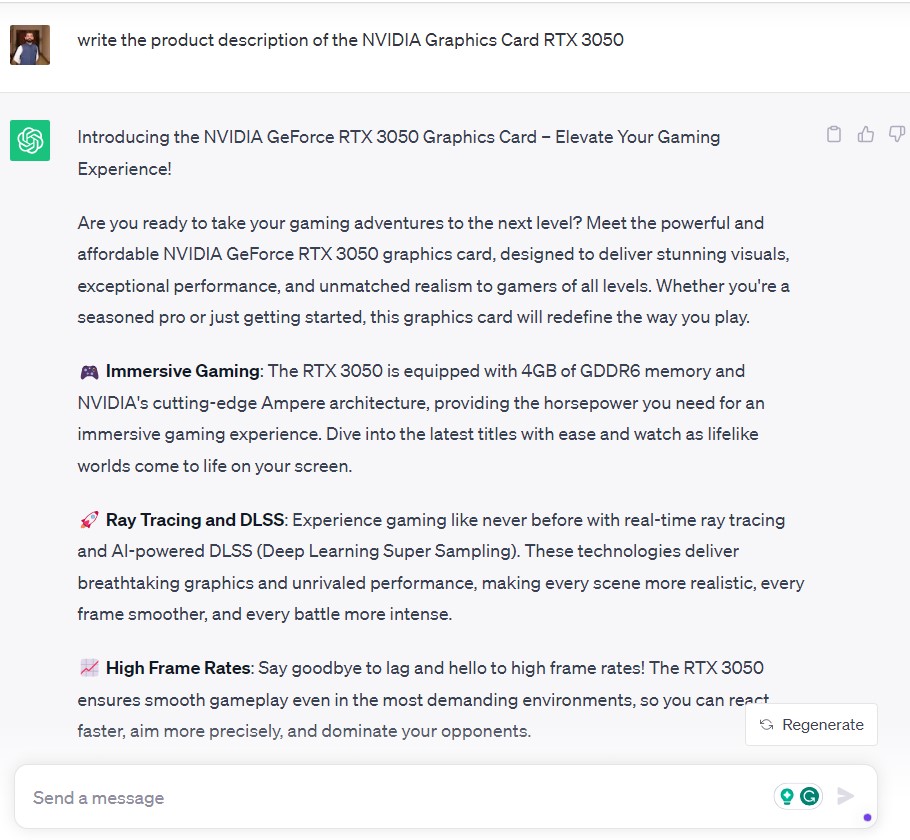
Will ChatGPT Replace My Job?
ChatGPT has impressive capabilities in natural language processing, speech recognition, and text generation tasks. However, there are certain aspects of human work that ChatGPT cannot replace. Let’s explore the reasons why ChatGPT cannot replace you in your job.
Human Interaction and Connection
One of the key aspects of many jobs is human interaction and connection. For example, jobs in fields such as counseling, teaching, and healthcare require human empathy and connection.
While ChatGPT can generate text responses based on certain parameters, it cannot replicate the nuances of human empathy and connection. It cannot truly understand the emotional needs of a patient or student in the way a human professional can. An example of such a scenario is presented below:
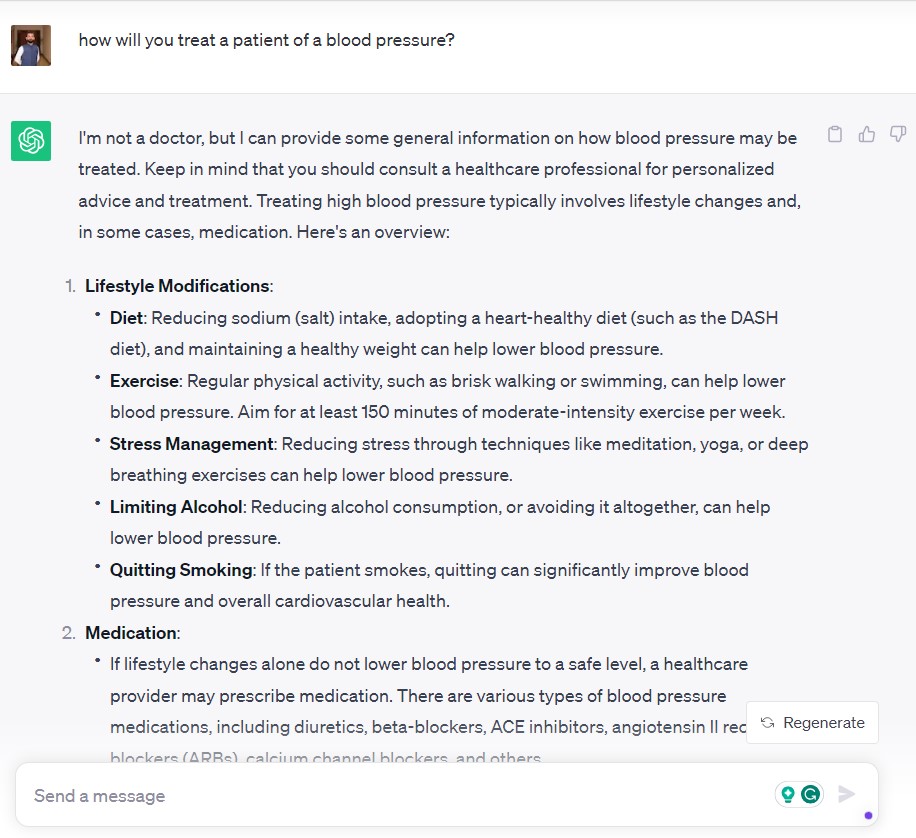
Critical Thinking and Problem-Solving
Many jobs require critical thinking and problem-solving abilities. While ChatGPT can provide data and insights, it cannot make complex decisions or solve problems independently.
For example, in fields such as law, engineering, and finance, human professionals must analyze data and make informed decisions based on multiple factors and variables.
Adaptability and Creativity
Humans are naturally adaptable and creative, which makes us well-suited for certain types of work. ChatGPT cannot easily automate jobs that require adaptation and creativity.
For instance, jobs in fields such as art, music, and writing require human creativity and imagination, which ChatGPT cannot replicate.
Unforeseen Circumstances and Variables
Another aspect of work that ChatGPT cannot replicate is the ability to handle unforeseen circumstances and variables.
Human professionals can adapt and respond to unexpected situations in a way that ChatGPT cannot. For example, human professionals handle complex and unpredictable situations in fields such as emergency response and disaster relief, and the same has been accepted by ChatGPT itself as below:
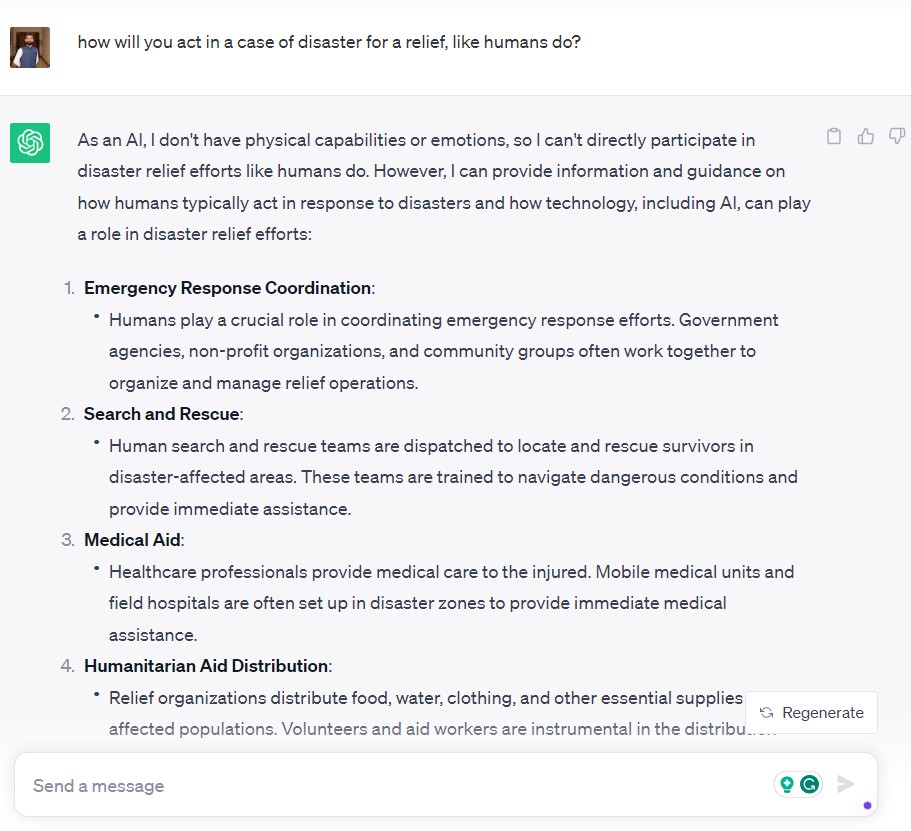
Can ChatGPT Assist Me?
Yes, ChatGPT can assist you in many ways! As an AI language model, ChatGPT can process and generate text based on certain parameters. Here are some ways ChatGPT can assist you:
Answering Questions and Providing Information
If you have a question about a particular topic or need information on a specific subject, ChatGPT can assist you by generating a response based on your query.
For example, we asked ChatGPT for directions to a certain location, a word’s definition, or the latest news on a specific topic, which it produced well, as shown below:
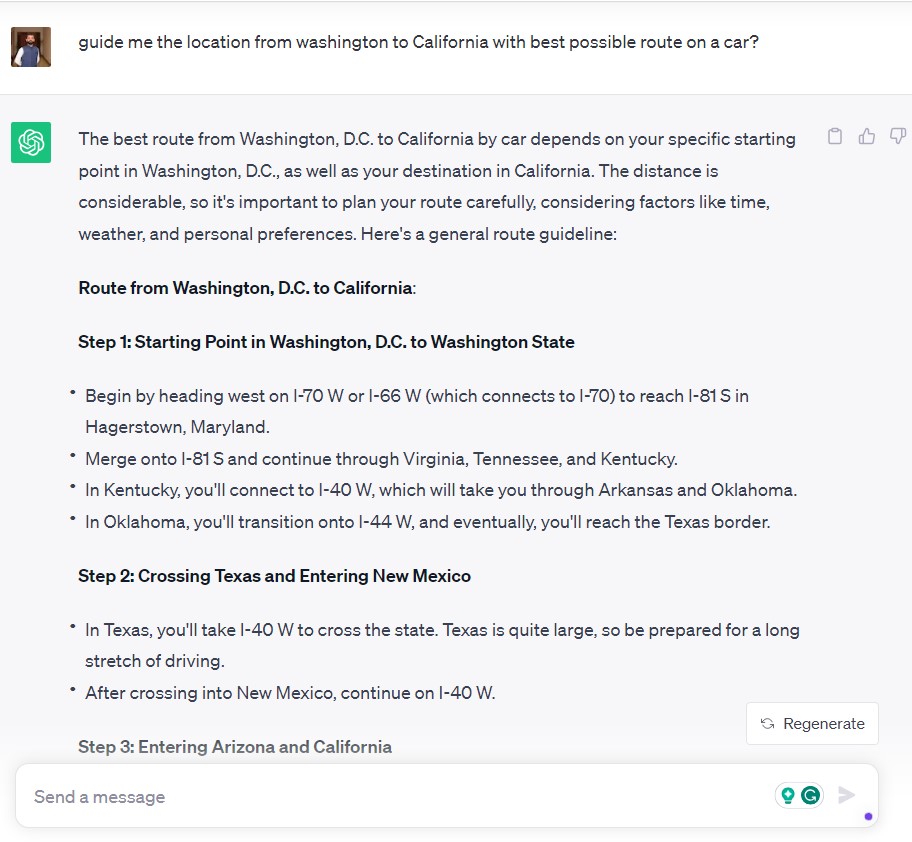
Providing Suggestions and Recommendations
ChatGPT can also assist you by providing suggestions and recommendations based on your preferences. For example, if you’re looking for a new restaurant to try, you can ask ChatGPT for recommendations based on your preferred cuisine or location.
Generating Text and Content
If you need to generate text or content for a particular purpose, ChatGPT can assist you by generating text based on certain parameters. For example, if you need to write a report or a summary, ChatGPT can generate text to use as a starting point.
Translating Languages
If you need to translate text from one language to another, ChatGPT can assist you by providing real-time language translation.
This can be useful if you’re communicating with someone who speaks a different language or if you’re trying to understand text in a different language. The translation is done by the ChatGPT from English to Spanish:
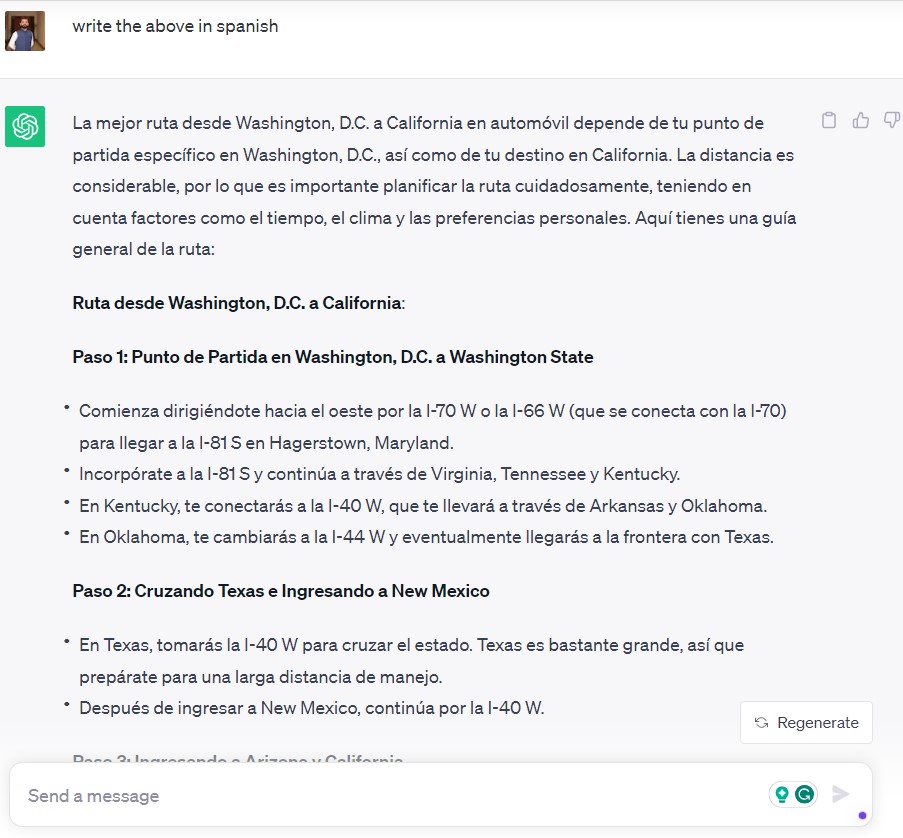
What Jobs Will ChatGPT Replace?
While I don’t believe ChatGPT will completely replace human jobs yet, some jobs are very likely to be replaced by ChatGPT in the future as generative AI improves.
Customer Service Representatives
One job that ChatGPT may replace in the future is that of a customer service representative. Chatbots powered by AI language models like ChatGPT can handle basic customer inquiries and provide solutions based on predefined rules and responses.
For example, if a customer needs to check the status of an order or wants to change their password, ChatGPT can provide quick and accurate responses without the need for human intervention.
Data Entry and Processing
ChatGPT can automate tasks such as entering data into spreadsheets or databases and can also process large amounts of data to generate insights and reports.
This can save companies time and money and improve the accuracy and efficiency of data processing. For example, we can provide a data set (in any language) to process/format the data in a specific format to save processing time:
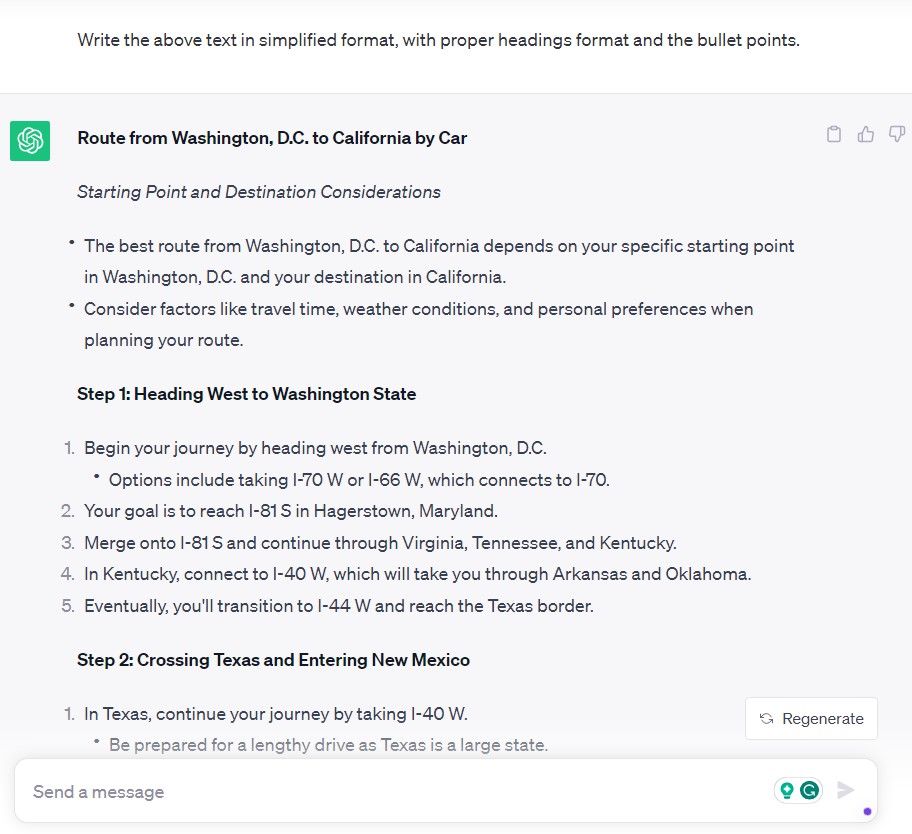
Content Creation and Curation
ChatGPT can generate text based on certain parameters, which can be useful in content creation and curation tasks.
For example, ChatGPT can be used to generate product descriptions, social media posts, and other forms of marketing content. This can save companies time and money and improve the consistency and quality of their content.
Language Translation
ChatGPT can also be used to automate language translation tasks. With its ability to process and generate text in multiple languages, ChatGPT can provide real-time language translation in various contexts.
This can be useful in industries such as travel and hospitality, where communication with customers in different languages is important.
What Jobs Will ChatGPT Struggle to Replace?
While ChatGPT has the potential to automate certain tasks and jobs that involve processing and generating text, there are some jobs that it may struggle to replace. Here are some jobs that ChatGPT may struggle to replace:
Creative Jobs
One area where ChatGPT may struggle to replace humans is in creative jobs, such as artists, musicians, writers, and designers. These jobs require high creativity, imagination, and originality, which may be difficult for an AI language model to replicate.
While ChatGPT can generate text and content based on certain parameters, it may struggle to create original and innovative works. We asked ChatGPT to write a blog post on the given topic as an expert. However, it was an ordinary to declare it a good one:

Emotional Intelligence
ChatGPT may struggle to replace human jobs that require emotional intelligence, like therapists, counselors, and social workers. These jobs require high empathy, compassion, and interpersonal skills, which may be difficult for an AI language model to replicate.
While ChatGPT can provide information and support to individuals in these fields, it may struggle to provide the same level of emotional support as a human.
Physical Labor
ChatGPT is an AI language model that is designed to process and generate text and, therefore, may struggle to replace jobs that require physical labor, such as construction workers, mechanics, and manufacturing workers.
These jobs require high physical skill and expertise, which may be difficult for an AI language model to replicate. For example, we asked ChatGPT how would you build a house for me? And it answered in a negation but has elaborated the process:
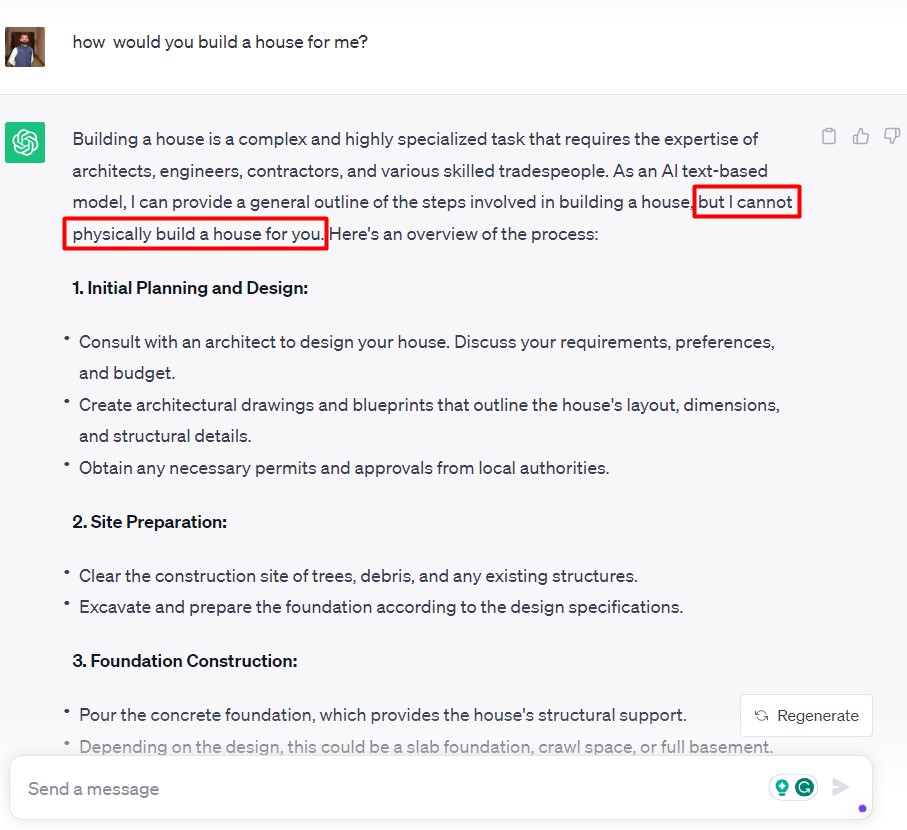
Critical Thinking and Decision Making
While ChatGPT can process and generate text based on certain parameters, it may struggle to replace jobs that require critical thinking and decision-making, such as lawyers, judges, and doctors.
These jobs require expertise and judgment, which may be difficult for an AI language model to replicate.
FAQs
Can ChatGPT Replace Human Jobs?
ChatGPT has the potential to automate certain tasks and jobs that involve processing and generating text, but it cannot replace all human jobs. Human skills and expertise will still be needed in many industries.
What Professions Will ChatGPT Replace?
ChatGPT can potentially automate jobs that involve processing and generating text, such as content creation, customer service, and data analysis.
However, it may struggle to replace jobs that require physical labor, emotional intelligence, critical thinking, and decision-making.
Will ChatGPT Replace Programmers?
ChatGPT is not designed to replace programmers. While it can generate code snippets based on certain parameters, it cannot write complete programs or understand the intricacies of programming languages.
Will ChatGPT Replace Writers?
ChatGPT can assist writers in generating content based on certain parameters, but it cannot replace writers. Writing requires a high level of creativity, imagination, and originality, which may be difficult for an AI language model to replicate.
Will ChatGPT Replace Lawyers?
ChatGPT cannot replace lawyers. While it can assist in legal research and provide information on certain legal topics, it cannot replace the expertise and judgment of a trained lawyer.
Will ChatGPT Replace Junior Developers?
ChatGPT cannot replace junior developers. Junior developers need to learn and develop their skills through hands-on experience and training, which cannot be replicated by an AI language model.
Is ChatGPT Going to Replace Front-End Developers?
ChatGPT cannot replace front-end developers. Front-end developers require a high level of expertise in web development technologies, such as HTML, CSS, and JavaScript, which cannot be replicated by an AI language model.